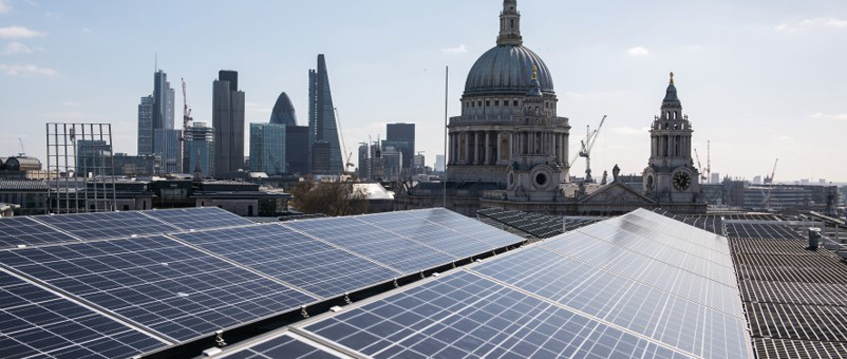Landsec has revealed a raft of new sustainability initiatives aimed at reducing carbon emissions from its construction work, prioritising renewable energy across its portfolio and ensuring environmental impacts are factored into all of its investment decisions.
The FTSE 100 property group says the measures make it the first UK real estate investment trust to set carbon emission reduction targets in line with keeping global warming to 1.5 degrees, a figure beyond which the UN’s Intergovernmental Panel on Climate Change has warned of grave environmental damage.

“The whole world is waking up to the challenge of climate change and the urgency of it, and real estate has an enormous role to play,” Caroline Hill, director of corporate affairs and sustainability at Landsec, tells EG. “The built environment is responsible for about 40% of global carbon emissions, so we need to be a huge part of the solution.”
Landsec set its first greenhouse gas reduction target back in 2017, but Hill says the time is right to double down on its efforts.
“Climate science has moved on,” she says. “Back then, we thought that keeping the world within 2 degrees of warming was what to aim for. We now know that to avoid the very worst impacts of climate change, we need to keep the world within 1.5 degrees of warming, so it was the right time to recalculate our targets and put it as part of a broader set of commitments we’ve made around being a net zero carbon business.”
For more on sustainability in real estate: EGSustainability hub
Landsec now aims to reduce carbon emissions by 70% from a 2014 baseline by 2030. The company has developed its strategy alongside the Science Based Targets Initiative, which works with companies to set emissions targets.
The company’s measures include setting a shadow price of carbon for all of Landsec’s investment decisions, an approach that creates a theoretical financial cost for the carbon produced by a project. The company said that adopting shadow pricing for carbon will let its investment committee calculate the carbon cost, as well as the financial cost, of all commercial decisions.
Landsec will also continue to reduce the carbon emissions linked to its construction work, with all future developments now net zero schemes, and new analysis of materials to favour those such as engineered timber over steel or concrete.
The company will also install renewable energy sources such as solar panels where possible in buildings across its portfolio.
These are ambitious steps, Hill acknowledges. “It’s a big target we’ve put out. A 70% reduction in carbon is the decoupling of our business’s growth from its carbon footprint. That’s bold and it’s challenging.”
Nonetheless, Hill says investors have given a “really positive” reaction to such initiatives, with many signing up for an environmental, social and governance investor roadshow the company launched last year.
“Just as businesses are changing and public awareness of this topic is massively increasing, so too for investors,” she says. “We’re starting to get a lot more questions now from our investors on our approach. And the questions are changing. A few years ago they were largely ‘what are you doing to reduce carbon in your business?’ We’re now getting a lot of questions around climate risk – ‘how are you assessing the risk that climate change poses to your portfolio?’ This is really relevant for real estate.”
Tangible transformation
Landsec’s development at 105 Sumner Street in Southwark, SE1, will be the company’s first net zero building, powered entirely by renewable energy. Its Lavington Street, SE1 development, meanwhile, will be constructed using a steel and timber hybrid structure, which the company said will save 6,000 tonnes of carbon compared with a more traditional design.
Sarah Ratcliffe, chief executive of the Better Buildings Partnership, of which Landsec is a member, welcomed the news, saying the strategy confirmed Landsec as “one of the sector leaders in responding to the challenges of climate change, matching corporate commitment with challenging targets, investment impact and practical action”.
Ratcliffe adds: “The actions they are taking on assets across the portfolio demonstrate that this is already delivering the tangible transformation of real estate that is so desperately needed.”
What comes next? Hill is proud that Landsec has become the first UK REIT to announce such an initiative, but she also hopes it will not be the last.
“Within our sector there is a lot of positive collaboration through organisations such as the Better Buildings Partnership,” she says. “I think there’s now more than ever a need for the whole industry to come together, not just our peers, but all the different actors along the value chain – that’s our main contractors, our architects and all our engineers – to make sure we achieve these targets.”
To send feedback, e-mail tim.burke@egi.co.uk or tweet @_tim_burke or @estatesgazette











